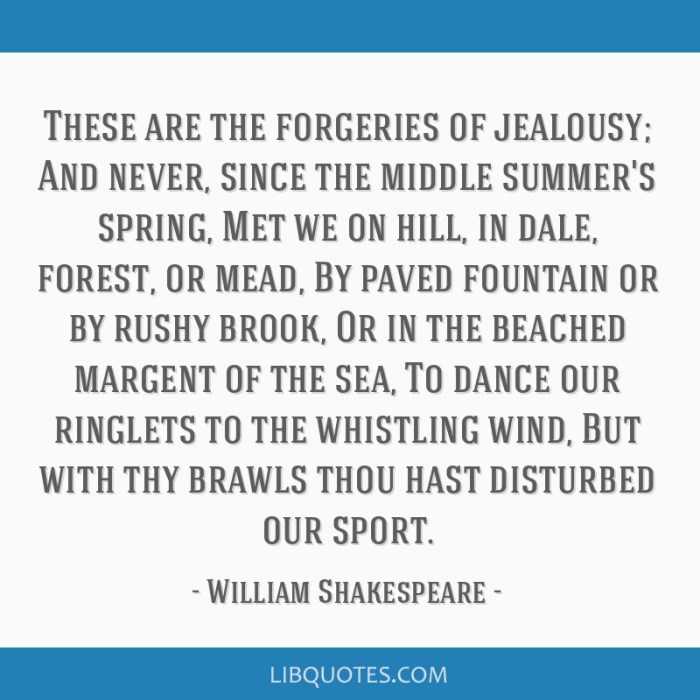In this exploration of “these are the forgeries of jealousy,” we delve into the phrase’s multifaceted nature, examining its literary, psychological, and cultural implications. Through a comprehensive analysis of its usage in literature, we uncover its role in shaping characters, themes, and plots.
Furthermore, we explore the psychological underpinnings of jealousy, shedding light on the emotional complexities and motivations that drive this powerful emotion. By examining the phrase’s cultural impact, we trace its influence on art, music, and societal attitudes, revealing the profound impact of jealousy on human relationships and dynamics.
Contextual Analysis: These Are The Forgeries Of Jealousy

The phrase “these are the forgeries of jealousy” is a well-known expression that has been used for centuries. It is often used to describe something that is not genuine or authentic. The phrase can also be used to describe something that is created with the intent to deceive or mislead.
There are many potential meanings and interpretations of the phrase “these are the forgeries of jealousy.” Some people believe that the phrase refers to the act of creating fake or counterfeit goods. Others believe that the phrase refers to the act of spreading false or misleading information.
Still others believe that the phrase refers to the act of creating false or misleading emotions.
Historical and Cultural Significance, These are the forgeries of jealousy
The phrase “these are the forgeries of jealousy” has a long and rich history. The phrase first appeared in the Bible, in the book of Proverbs. In the Bible, the phrase is used to describe the act of creating false or misleading information.
The phrase has also been used in many other works of literature, including Shakespeare’s plays and the works of Jane Austen.
The phrase “these are the forgeries of jealousy” has also been used in many different cultures. In some cultures, the phrase is used to describe the act of creating fake or counterfeit goods. In other cultures, the phrase is used to describe the act of spreading false or misleading information.
Still other cultures use the phrase to describe the act of creating false or misleading emotions.
Literary Examination

The phrase “the forgeries of jealousy” has a rich literary history, appearing in both classic and contemporary works. It encapsulates the complex emotions and destructive nature of jealousy, often serving as a catalyst for character development, thematic exploration, and plot progression.
Literary Devices and Techniques
Authors employ various literary devices and techniques to convey the forgeries of jealousy. These include:
- Metaphor:The phrase itself is a metaphor, comparing jealousy to a forgery. This suggests that jealousy is not authentic or genuine, but rather a distorted and deceptive emotion.
- Imagery:Authors often use vivid imagery to evoke the destructive consequences of jealousy. For example, in Shakespeare’s Othello, Iago’s jealousy is depicted as a “green-eyed monster” that consumes him.
- Symbolism:The color green is often associated with jealousy, as in the phrase “green with envy.” Authors may use green imagery to symbolize the corrosive and destructive nature of this emotion.
- Foreshadowing:The forgeries of jealousy can foreshadow tragic events. In Sophocles’ Oedipus Rex, Oedipus’s jealousy of Laius leads him to kill his father and marry his mother, fulfilling a prophecy that he would commit these heinous acts.
Psychological Perspective
The phrase “these are the forgeries of jealousy” encapsulates the complex psychological implications of jealousy, a potent emotion that can profoundly impact human relationships and dynamics.
Jealousy arises from feelings of insecurity, inadequacy, and fear of losing a valued possession or relationship. It is often fueled by perceived threats or actual betrayals, triggering intense emotional responses that range from anxiety and anger to suspicion and hostility.
Emotional States and Motivations
- Anxiety and Insecurity:Jealousy stems from feelings of insecurity and a perceived lack of control over the relationship. The individual may fear losing the love and attention of their partner to a rival.
- Anger and Resentment:When jealousy is aroused, it can manifest as anger and resentment towards the perceived threat. The individual may feel betrayed, humiliated, and even vengeful.
- Suspicion and Mistrust:Jealousy often breeds suspicion and mistrust. The individual may become overly suspicious of their partner’s actions and motives, constantly seeking reassurance and evidence of fidelity.
Cultural Impact

The phrase “these are the forgeries of jealousy” has had a significant cultural impact, influencing art, music, and other forms of cultural expression. It reflects societal attitudes towards jealousy and related emotions, such as envy, resentment, and suspicion.
Art
In art, the phrase has been used to explore the destructive power of jealousy. For example, in William Shakespeare’s play “Othello,” Iago’s jealousy of Othello leads him to manipulate and destroy both Othello and his wife, Desdemona. Similarly, in the novel “The Great Gatsby” by F.
Scott Fitzgerald, Gatsby’s jealousy of Tom Buchanan ultimately leads to his downfall.
Music
In music, the phrase has been used to express the pain and anguish of jealousy. For example, in the song “Jealous” by Beyoncé, the singer laments the pain of being in love with someone who is unfaithful. Similarly, in the song “Jealous Guy” by John Lennon, the singer expresses his regret over his past jealousy and possessive behavior.
Other Forms of Cultural Expression
The phrase has also been used in other forms of cultural expression, such as film, television, and literature. For example, in the film “Fatal Attraction,” a man’s jealousy of his lover leads him to stalk and terrorize her. Similarly, in the television series “Breaking Bad,” Walter White’s jealousy of his former business partner leads him to become a ruthless drug kingpin.
Question & Answer Hub
What is the significance of the phrase “these are the forgeries of jealousy”?
The phrase encapsulates the deceptive and often destructive nature of jealousy, highlighting its ability to distort reality and create illusions.
How does jealousy manifest in literature?
Jealousy serves as a powerful literary device, driving conflicts, shaping character arcs, and exploring the complexities of human relationships.
What psychological insights can be gained from the phrase “these are the forgeries of jealousy”?
The phrase reveals the irrational and often self-destructive nature of jealousy, exposing the emotional turmoil and psychological distress it can inflict.
